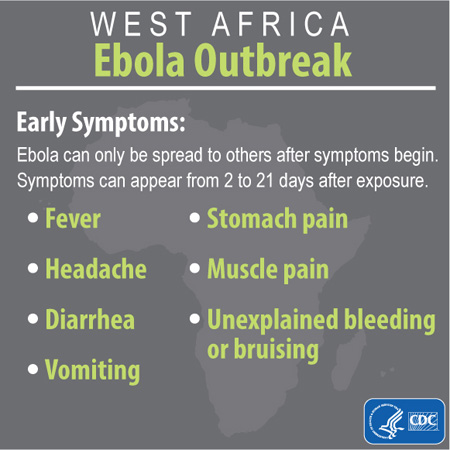
How do I protect my patients and staff if someone presents with symptoms of Ebola and similar infections?
Before the unexpected event happens — whether it's a possible Ebola patient or someone with another dangerous infectious disease coming to your office — physicians in the outpatient setting should be aware of the recommendations for personal protective equipment and environmental infection control measures in ambulatory settings. The TMA Committee on Infectious Diseases urges you to study that document and make sure you are prepared.
After that, protecting yourself, your staff, and your patients from Ebola starts with your telephone. Train your office staff to ask each person who calls your office for an appointment if he or she has symptoms of a febrile illness (fever, cough, nausea, vomiting, diarrhea, etc.).
Per the U.S. Centers for Disease Control and Prevention (CDC), if a patient reports a fever, staff should next ask about where they have traveled recently.
If the patient's travel history includes any of the following countries:
- West Africa in the past 21 days (give the caller the specific date). This includes Guinea, Liberia, Sierra Leone, and Mali. These patients are in an Ebola risk group.
- Countries in or near the Arabian Peninsula in the past 14 days. This includes Bahrain, Iraq, Iran, Israel, the West Bank and Gaza, Jordan, Kuwait, Lebanon, Oman, Qatar, Saudi Arabia, Syria, the United Arab Emirates (UAE), and Yemen. These patients should be evaluated for Middle East Respiratory Syndrome Coronavirus (MERS-CoV) Infection.
For potentially infected patients, the emergency department (ED) is the proper place for their evaluation.
Immediately contact the ED about the patient and to determine how the department wants the patient to travel to and enter the facility. If the patient is self-transporting, ask where the patient should park.
Call the patient back with specific instructions regarding how to get to and enter the ED and where to park (if applicable). It is important that the patient not mingle with other waiting patients.
If a febrile patient has already presented in your office, have your staff obtain a travel and exposure history. If Ebola or MERS-CoV is possible:
- Immediately isolate the patient as best as you can.
- If you have a mask, have the patient put it on.
- Have the patient perform hand hygiene with an alcohol-based product.
- Follow CDC recommendations for personal protective equipment. (CDC 10-20-14)
- Assess the patient's travel and disease history and exposure history.
- Perform a limited assessment without drawing a blood specimen.
If you feel the patient might have either Ebola or MERS-CoV:
- Call the ED about the patient and for instructions about entering the ED and parking.
- Make a list with contact information of everyone in the office (staff, patients, etc.), and notify them of their potential exposure.
Immediately contact your local health department or regional health office and the DSHS infectious disease unit at (800) 252-8239 for further instructions.
Revised Nov. 17, 2014
NOTE: This information, which is consistent with CDC guidelines that exist on the topic, was compiled from various multi-specialty groups in Texas. As the Ebola situation continues to change and evolve, TMA encourages physicians to constantly monitor any new guidance and advice from the CDC and Texas Department of State Health Services.
For additional information, see: